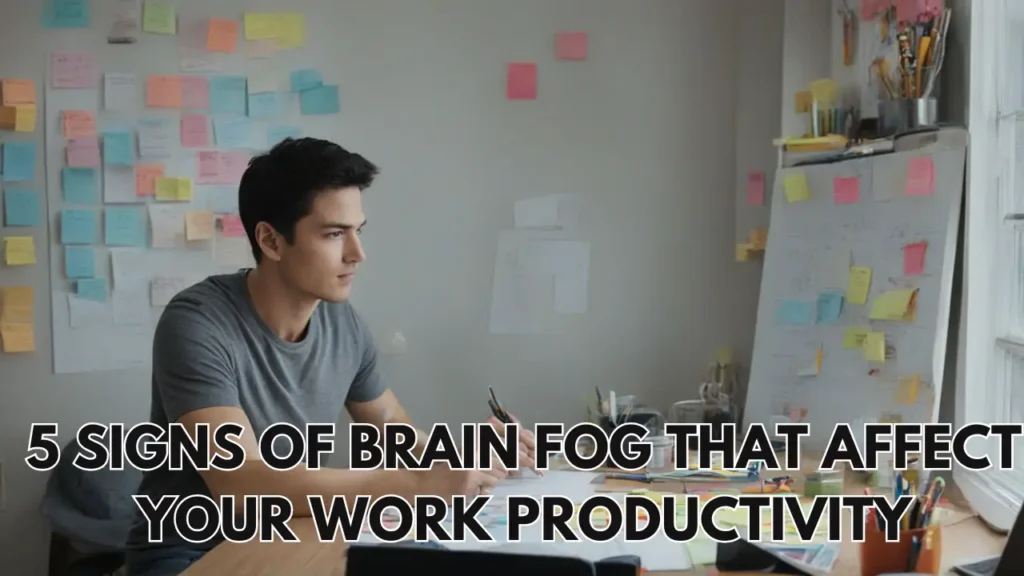Have you ever found yourself staring at the screen, unable to concentrate or struggling to recall simple details? Or ever had those moments where it feels like your mental clarity has taken a detour?
You’re not alone; you might be dealing with brain fog. So what exactly is brain fog? Imagine trying to think through a cloud – it’s that hazy feeling that clouds your focus and productivity.
But first, let’s get to the root of the matter. What causes brain fog? Is it just a result of a late-night Netflix binge or something more? Stick around as we unravel the mystery behind this mental fog and equip you with insights to reclaim your cognitive clarity.
1. Difficulty Concentrating
Difficulty concentrating – have you ever found yourself staring at your to-do list, trying to focus, but your mind seems to have a mind of its own?
Picture this: it’s a busy workday, you’re trying to complete that project, and suddenly your mind starts wandering like a lost puppy.
The struggle is real, and it’s not just you; it’s a classic symptom of brain fog. Now, brain fog is sneaky; it interferes with our neurotransmitters – those messengers responsible for communication in the brain.
When these messengers get mixed up, it’s like trying to send a text with autocorrect gone wild; your focus goes adrift, and the simplest tasks become mental marathons.
But why does this happen? Stress, lack of quality sleep, and even certain foods can throw our neurotransmitters into disarray, leading to difficulty concentrating.
So, the next time you catch your mind taking a stroll when it should be sprinting, remember it might just be brain fog paying a visit.
2. Memory Issues
Memory issues – ever found yourself desperately searching for words or forgetting where you left your glasses? That’s the brain fog’s subtle handiwork.
Brain fog doesn’t just cloud your focus; it also has a knack for misplacing your mental post-it notes. It’s because of the stress hormone cortisol throwing a wild party in your brain; it can mess with your hippocampus, the memory powerhouse.
But fear not, here’s a game plan to outsmart the memory glitches – incorporate mindfulness practices into your routine to alleviate stress.
A calm mind is a memory-friendly mind. Fuel your brain with omega-3 fatty acids and antioxidants found in fish, nuts, and berries – your brain’s best allies. Also, prioritize quality sleep; those 7 to 8 hours of restful sleep are like a magic potion for your memory.

3. Energy, Mental Fatigue
Low energy, mental fatigue – ever felt like your brain is running on empty, and your mental energy is doing the limbo under the bar of productivity?
Every task becomes a mental marathon, and your brain is stuck in slow motion. Sounds familiar? Welcome to the realm of low energy and mental fatigue, classic symptoms of brain fog.
Why does this happen? Your brain requires a steady supply of energy, and when that supply is disrupted, it’s like trying to power a spaceship with a single small battery.
But fear not, here’s the strategy to rekindle that mental spark – picture your body as a high-octane machine that needs the right fuel. Keep yourself hydrated, and make sure your meals are a mix of brain-boosting nutrients.
Also, get that body moving; physical activity isn’t just for the muscles; it’s a jump start for your brain. A short walk or some light exercises can work wonders.
4. Procrastination
Procrastination – ever had a to-do list that feels like it’s been around forever? Imagine this: deadlines creeping in, tasks piling up, and yet you find yourself organizing your desk instead of tackling the work.
Sound familiar? You’ve just met the brain fog sign – procrastination. But why does this happen? It’s not just about delaying tasks; it’s a brain fog trick.
When brain fog takes over, it messes with your decision-making and task-starting abilities. It’s like your brain hits pause on being productive.
Let’s break it down – stress, feeling tired, and having a foggy mind create the perfect recipe for procrastination. It’s not laziness; it’s your brain signaling, “Hold on, I need a break.”
5. Sluggish Thinking
Imagine this – you’re facing a decision, and it feels like your brain is stuck in slow motion. It’s not about lacking intelligence; it’s the brain fog puppeteer pulling the strings of sluggish thinking.
But why does this mental sluggishness occur? It’s not a lack of brainpower; it’s a brain fog masterpiece. When brain fog sets in, it interferes with the speed and efficiency of your thought processes.
It’s like your brain is navigating a mental fog, making every decision and thought feel like a tree through syrup.
Stress, lack of quality sleep, and a foggy mind create the perfect storm for sluggish thinking. It’s not about your intelligence; it’s about the foggy road your brain is navigating.
Practice stress-reducing techniques such as deep breathing, meditation, or yoga; these activities can help calm your mind and improve overall cognitive function.
Also, get enough quality sleep each night; adequate sleep is crucial for mental clarity and sharp thinking.
And there you have it – we’ve navigated the intricate terrain of brain fog, uncovering its subtle but impactful signs. If you resonated with any of the signs we discussed today, know that you’re not alone.
Brain fog can affect us all, and recognizing the symptoms is the first step toward regaining control. Implementing small changes in your daily routine, whether it’s practicing mindfulness, ensuring quality sleep, or staying hydrated, can make a significant difference.


